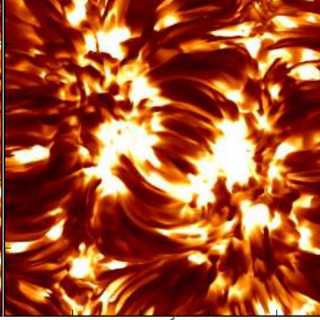Bibcode
Trujillo-Bueno, J.; Landi Degl'Innocenti, E.; Belluzzi, L.
Referencia bibliográfica
Astronomy and Astrophysics, Volume 551, id.A84, 13 pp.
Fecha de publicación:
3
2013
Revista
Número de citas
12
Número de citas referidas
9
Descripción
The spectral line polarization of the radiation emerging from a
magnetized astrophysical plasma depends on the state of the atoms within
the medium, whose determination requires considering the interactions
between the atoms and the magnetic field, between the atoms and photons
(radiative transitions), and between the atoms and other material
particles (collisional transitions). In applications within the
framework of the multiterm model atom (which accounts for quantum
interference between magnetic sublevels pertaining either to the same
J-level or to different J-levels within the same term) collisional
processes are generally neglected when solving the master equation for
the atomic density matrix. This is partly due to the lack of
experimental data and/or of approximate theoretical expressions for
calculating the collisional transfer and relaxation rates (in particular
the rates for interference between sublevels pertaining to different
J-levels, and the depolarizing rates due to elastic collisions). In this
paper we formally define and investigate the transfer and relaxation
rates due to isotropic inelastic and superelastic collisions that enter
the statistical equilibrium equations for the atomic density matrix of a
multiterm atom. Under the hypothesis that the interaction between the
collider and the atom can be described by a dipolar operator, we provide
expressions that relate the collisional rates for interference between
different J-levels to the usual collisional rates for J-level
populations, for which experimental data or approximate theoretical
expressions are generally available. We show that the rates for
populations and interference within the same J-level reduce to those
previously obtained for the multilevel model atom (where quantum
interference is assumed to be present only between magnetic sublevels
pertaining to any given J-level). Finally, we apply the general
equations to the case of a two-term atom with unpolarized lower term,
illustrating the impact of inelastic and superelastic collisions on the
scattering line polarization through radiative transfer calculations in
a slab of stellar atmospheric plasma anisotropically illuminated by the
photospheric radiation field.
Proyectos relacionados

Magnetismo, Polarización y Transferencia Radiativa en Astrofísica
Los campos magnéticos están presentes en todos los plasmas astrofísicos y controlan la mayor parte de la variabilidad que se observa en el Universo a escalas temporales intermedias. Se encuentran en estrellas, a lo largo de todo el diagrama de Hertzsprung-Russell, en galaxias, e incluso quizás en el medio intergaláctico. La polarización de la luz
Tanausú del
Pino Alemán